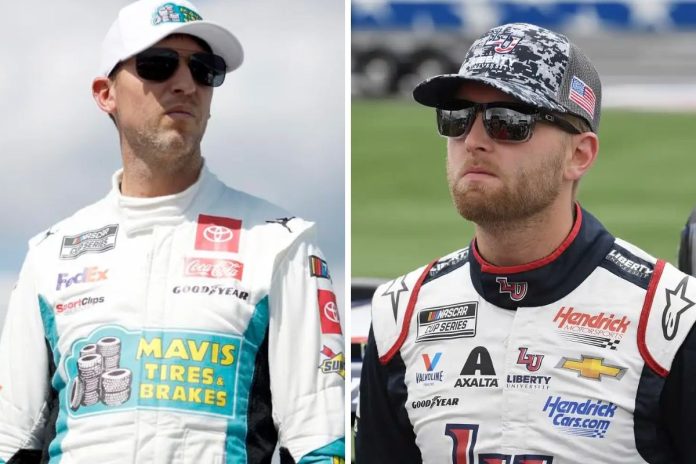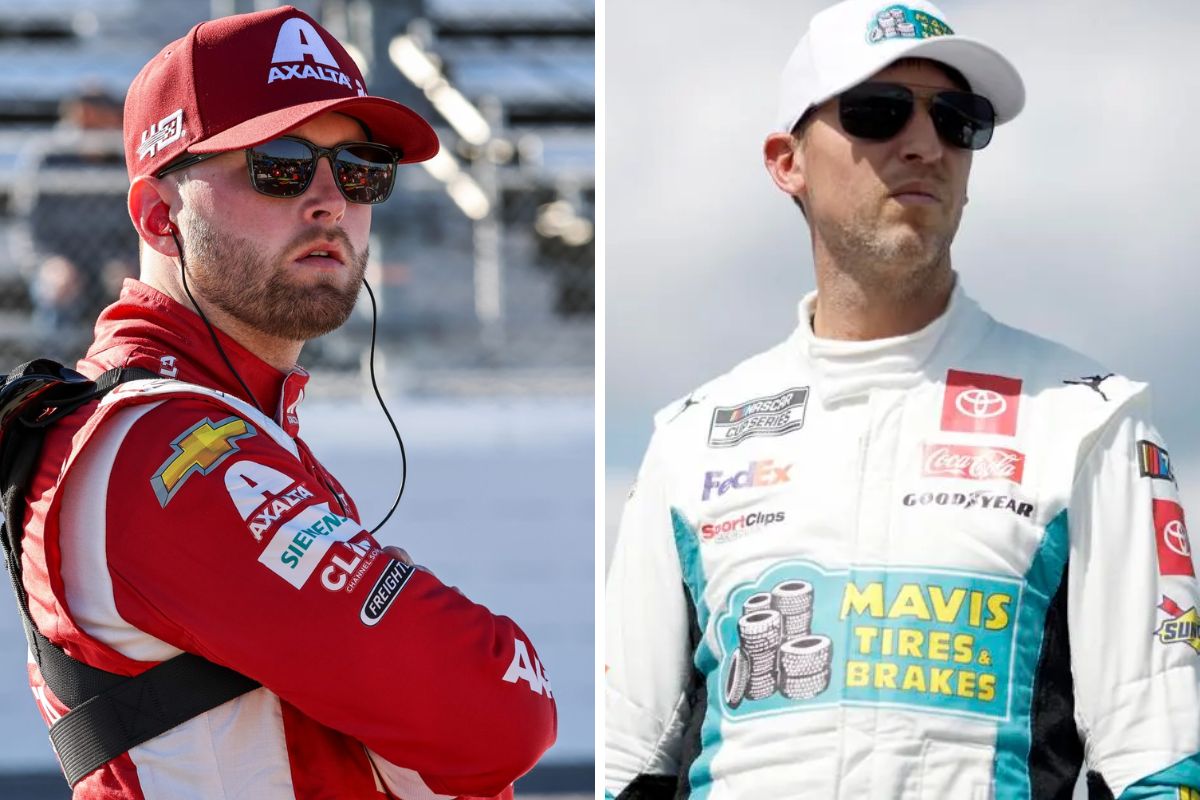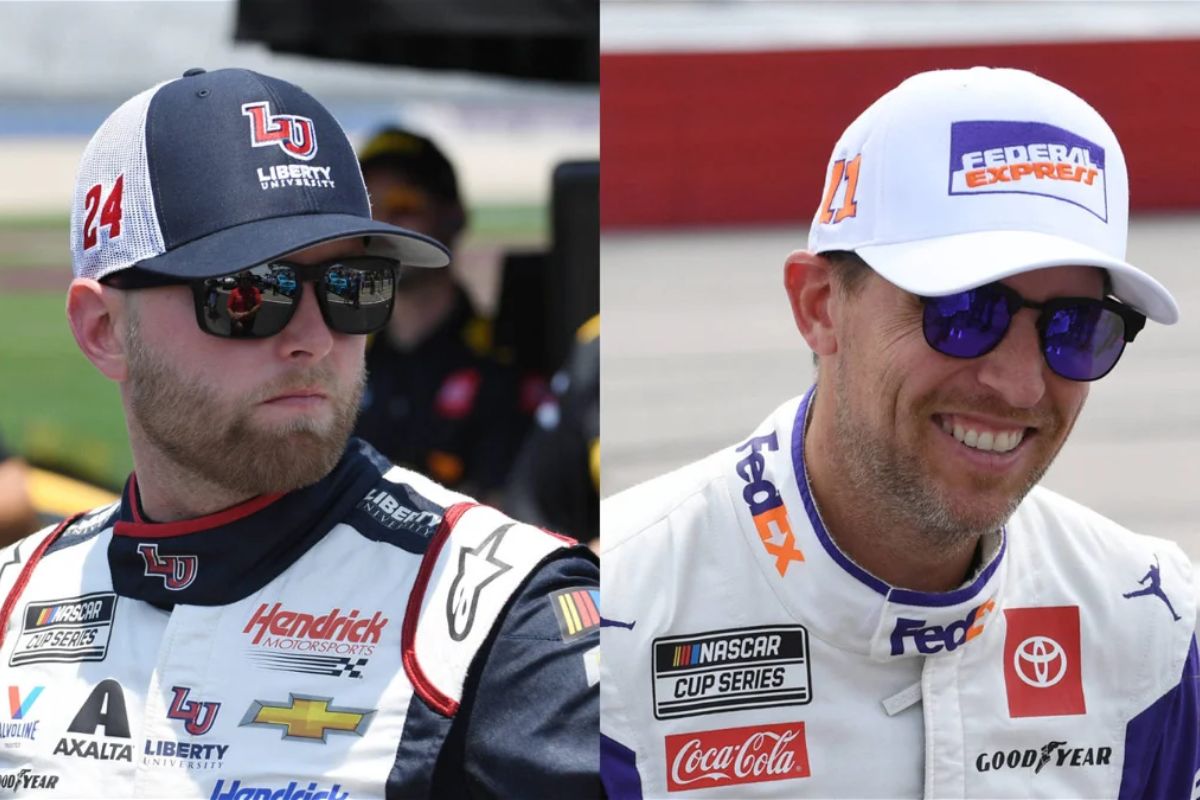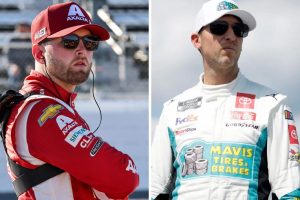Hamlin’s Take on Byron’s Success: Denny Hamlin’s analysis of William Byron’s notable accomplishments in comparison to Christopher Bell’s more modest record this season opens an intriguing discussion on the strategic elements that define success in NASCAR. Hamlin, might suggest that while Byron’s victories are a product of tactical brilliance and precise execution under stress, Bell’s single win highlights a different kind of resilience and potential that has yet to be fully harnessed.
Key Takeaways
- Hamlin acknowledges Byron’s strategic expertise and adaptability, particularly highlighted by his recent win at Martinsville.
- Hamlin notes Bell’s resilience and recovery, especially following setbacks like the spinout at Texas.
- He compares Bell’s under-the-radar success style to Byron’s more visible victories and media presence.
- Hamlin suggests Bell could benefit from adopting some of Byron’s aggressive yet calculated racing strategies.
- He emphasizes the importance of team dynamics, recognizing the strength of Byron’s Hendrick Motorsports team.
Talladega Contenders: William Byron and Christopher Bell
As the NASCAR circuit approaches Talladega, all eyes are on William Byron and Christopher Bell, two dynamic drivers yet to prove their spirit on this notoriously unpredictable superspeedway. William Byron, with his three wins this season, including an impressive victory at the Daytona superspeedway, certainly carries momentum.
Christopher Bell, while having a slightly less spectacular season than Byron, showcases a robust set of skills that could potentially disrupt the expected order. Bell’s challenge lies in surpassing the internal competition within Joe Gibbs Racing and asserting himself as a leader capable of countering Hendrick Motorsports’ dominance.
Denny Hamlin’s Insights on Christopher Bell’s Challenges
Denny Hamlin recently shared valuable insights into Christopher Bell’s strategic challenges, particularly highlighting his teammate’s resilience in overcoming adversities during races. Bell’s performance at the Texas race represents a season filled with promise and pitfalls. Starting just outside the top 10, Bell demonstrated initial strategic prowess, navigating the complexities of the track with a calculated aggression that kept him in the mix.
“Because I don’t lead laps like my teammates. Well I do win races, and I do run up front but (all) people talk about is, who’s controlling the race? Who’s showing that they’re the best”-(Denny)
Hamlin’s reflections on Bell’s trials suggest a broader narrative of adaptability and grit. The spinout, while a significant hurdle, also provided Bell with an opportunity to showcase his recovery skills, working his way back into the race with a determination that speaks to his underlying skill set and mental fortitude.
Moreover, Hamlin’s stance points to an essential aspect of racing strategy — the ability to swiftly readjust plans in response to on-track incidents. Bell’s quick adaptation post-spinout exemplifies a crucial trait for any top-tier NASCAR driver – resilience.
Christopher Bell’s Perspective on Being Overlooked
Christopher Bell openly addresses the reasons behind being frequently overlooked within his racing team. According to Bell, the core issue stems from the dynamics of visibility during races. While he secures wins and maintains a strong presence at the front, his performances don’t typically involve leading laps dominantly or controlling the pace of the race, which are more prominent and therefore more celebrated aspects of racing.
(Hamlin) – “So you can’t argue that Christopher Bell gets results. Like, he gets results.”
Bell’s perspective sheds light on an interesting facet of professional racing: the weight of perceptual dominance in sports media and fan engagement. It’s not merely about winning but about how one wins.
William Byron’s Recent Performances and JGR-HMS Tug-of-War
While Christopher Bell discusses the subtleties of recognition in racing, William Byron’s recent performances spotlight the ongoing rivalry between Joe Gibbs Racing and Hendrick Motorsports. Byron’s rise in the latest races highlights not just his driving skills but also highlights the strategic tactics that Hendrick Motorsports employs to dominate in high-stakes scenarios.
This performance, adds strategic detail to the discussion. It raises questions about race tactics and the psychological warfare potentially at play between competing teams. Additionally, Byron’s ability to silently hold his track position across stages until breaking into the top three is reflective of a carefully calculated approach that HMS seems to have mastered.
Comparing Byron and Bell’s Performances
Analyzing the racing performances of William Byron and Christopher Bell highlights the competitive dynamic between Hendrick Motorsports and Joe Gibbs Racing through distinct strategies and results. Byron’s recent victory at Martinsville, where he surged from a start at P18 to secure his second win at this historic track, emphasizes a pattern of strategic excellence and adaptability within his team. This win not only validates Byron’s increasing skills but also commemorates Hendrick Motorsports’ glorious legacy at a track synonymous with their first win 40 years ago.
Conversely, Christopher Bell’s season, marked by a solitary win at Phoenix, presents a narrative of potential yet inconsistent momentum. His second-place finish to Byron at COTA further shows a season of near-misses. While Bell demonstrates speed and competitiveness, his chase is often affected by an inability to fully capitalize during important moments.
News in Brief: Hamlin’s Take on Byron’s Success
Denny Hamlin’s analysis of William Byron and Christopher Bell’s performances reveals significant differences in their racing strategies and career progressions.
While Byron’s strategic planning has led him to notable victories, Bell’s consistent yet singular win highlights a need for strategic reevaluation to reach higher competitive levels.
This comparison not only showcases the individual challenges and achievements of each driver but also emphasizes the dynamic competitive landscape within NASCAR.
Our Reader’s Queries
Q. How many wins does William Byron have?
A. Byron boasts nine victories in the last 44 Cup Series races, including notable victories at the season-opening Daytona 500 on February 18, a win at Austin, Texas on March 24, and another victory at Martinsville Speedway on April 7. Overall, Byron has secured an impressive total of 13 wins dating back to 2020.
Q. How many cup wins does Denny Hamlin have?
A. Denny Hamlin pilots the No. 11 Toyota for Joe Gibbs Racing and co-owns 23XI Racing alongside NBA legend Michael Jordan in the NASCAR Cup Series. With an impressive total of 53 wins to his credit, Hamlin’s victories include notable victories in the Coca-Cola 600 (2022), Daytona 500 (2016, 2019, 2020), and Southern 500 (2010, 2017, 2021).
Q. Has William Byron won a road course?
A. Byron has secured victories in two of the most recent three road course races, showcasing his skills by winning from the pole at Circuit of The Americas in dominant fashion. Leading for 42 of the 68 laps, he fended off a determined Christopher Bell in the closing stages, thus becoming the first multi-race winner in the NASCAR Cup Series this season.
ALSO READ: Denny Hamlin’s Bold Call: NASCAR Needs a Formula 1 Makeover!





